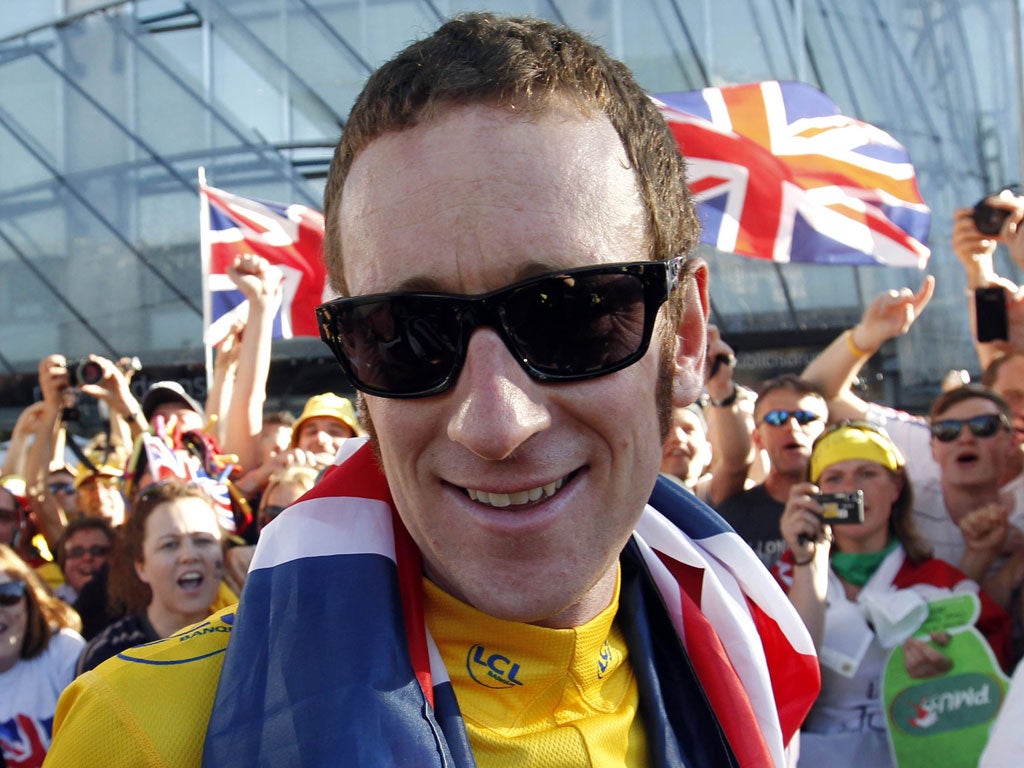You don't have to copy Bradley Wiggins. There is a better way
Walking has amazing health benefits (as well as being free), writes Andrew Martin

All those who thought they'd take up cycling, after observing the triumphs of Bradley Wiggins, were given three reasons this week to reconsider. First, Bradley himself was knocked off his bike in Wrightington in Lancashire by a woman driving a van, who exclaimed (according to The Sun) "OMG! I've knocked down Wiggo." Second, Shane Sutton, the coach of the GB cycling team, was hit by a car in Manchester. Third, while Wiggins-related articles mentioned that the number of cyclists killed on the roads has risen in each of the past three years, a piece of medical research from America proclaimed that walking briskly for 75 minutes a week can increase your life expectancy by 18 years.
Of course, there are impediments to taking up walking. One is the growth of our towns. It is said that the last man to walk every street in London was Thomas Babington Macauley. That would have been impressive even if he hadn't written all that history and poetry, and drawn up a penal code for India, but he died in 1859, before London really took off. (His great-nephew, the historian George Macauley Trevelyan, was another great walker. He wrote: "I have two doctors, my left leg and my right.") Also militating against is the fashion for internet shopping, closely related to the modern condition of bone-idleness. (Two-thirds of British adults fail to do the 150 minutes of moderate aerobic exercise recommended per week.)
Another factor is that the utility and practicability of regular walking are so elemental as to be hard to express. The scale of the open goal is somehow intimidating. The Transport for London walking campaign is neatly called "Legible London" and the literature trepidatiously begins by reminding us that walking is free. It seems such an absurdly simple concept that the TfL literature tends to dignify it as "walking activity", and this, of course, is a "transport mode". (The campaign is buttressed by elegant signs, which are vandal-proof, so the part reading "You are here" cannot be obliterated by chewing-gum, as was uniformly the case with public street maps in my youth.)
The NHS campaign "Walking for Health" suggests the aspirant walker begin by acquiring a pair of shoes (if they haven't already got any). As far as I can see, nobody has stated the obvious to the extent of pointing out that walking is safe, but it is. How many times have you read: "He died in a tragic walking accident"? Given the health benefits, walking is, in fact, safer than not walking. And need I point out that walking is good for the environment?
I walk about five miles a day. I claim no moral superiority in this; indeed, part of the reason I walk is that you can do it when drunk (sort of). As a writer, I need what non-writers naively call "inspiration" on a daily basis, and I find that walking is the only way. If I could write as I walked, like the late Scottish novelist Nigel Tranter, I would. (He used small, stiff index cards and presumably rain-proof ink.) Charles Dickens walked an average of 15 miles a day. He liked to walk by night if he couldn't sleep. Walking past London's most notorious prison, he wrote: "In those small hours when there was no movement in the streets, it afforded matter for reflection to take Newgate in the way and, touching its rough stone, to think of the prisoners in their sleep ..."
Note "afforded matter for reflection". Now that we are bombarded with electronic noise on all buses and trains, it is worth remembering that walking is silent. You are left alone with your own thoughts, and if that sounds off-putting, I contend that those thoughts will be more positive at the end of the walk than they were at the beginning.
Join our commenting forum
Join thought-provoking conversations, follow other Independent readers and see their replies
Comments
Bookmark popover
Removed from bookmarks